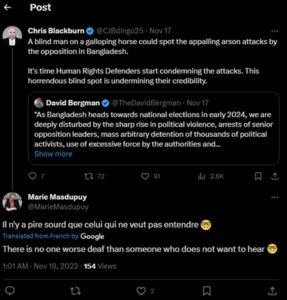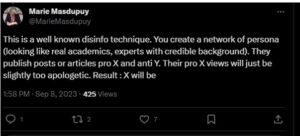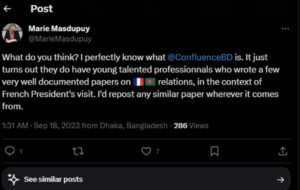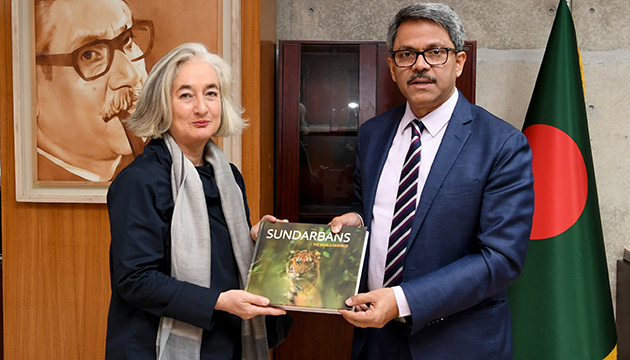Ever since Donald Trump broke into the American political scene, the social media platform formerly known as Twitter has been a key avenue of official communications. Of course, the platform is also a venue for passing thoughts, not always well-informed, of individuals —private citizens as well as individuals holding public office or representing governments. Whether her posts on the platform represent her personal views or the official stance of the Macron Administration, recent social media activities of the French Ambassador to Bangladesh deserve greater scrutiny.
Take this post from 18 Nov, for example. She is responding to a thread on political violence in Bangladesh.

On the face of it, this might not appear unusual. However, her comment completely ignores the broader context of Bangladesh’s deepening political crisis.
A parliamentary election has been scheduled for 7 January 2024. The last two elections were marred by massive irregularities and rigging —in 2014, more than half the MPs up for election were elected unopposed, giving the ruling Awami League governing majority before a single vote was cast; in 2018, ballot boxes were stuffed the night before the polling day and for all practical purposes, voting ceased by mid-morning. Given that background, the opposition parties have demanded an election-time non-partisan government and are set to boycott any election held under Prime Minister Sheikh Hasina.
The PM has flat out refused to meet the opposition demand, and has asked her party men to run as ‘dummy candidates’ to give the election a fig leaf of credibility. Meanwhile, to ensure this Potemkin election, her government has violently cracked down on the opposition, convicting scores in sham trials. A common ploy of the regime is to stage an arson incident and then arrest hundreds. For example, an UN Human Rights High Commissioner briefing published soon after the violent ending of the 28th October opposition grand rally alleged that credible evidence suggest that government agents were responsible for a lot of the violence and arson attacks.
The regime’s heavy-handed actions have drawn attention to global human rights activists. Human Rights Watch, for example, asks diplomatic partners to raise alarm. The French Ambassador, on the other hand, appears clueless at best, or more realistically, a complicit cheerleader of this horrific state-sanctioned violence!
Or take this from 8 September.


This seemingly nuanced take by the Ambassador on the blight of disinformation is, on closer inspection, something either cynical or sinister. The background here is this —a detailed investigation by the AFP found that hundreds of articles praising the Hasina regime were authored by fake ‘experts’ with false photos and credentials. That is, the Ambassador was, in fact, questioning the AFP journalists who exposed an insidious disinformation campaign of a brutal regime.
The irony here, albeit unintentionally by the Ambassador, is worthy of Voltaire.
Is the Ambassador really so uninformed? If so, the French taxpayers should demand her removal for gross incompetence.
Or does she in fact cosy up to the regime propagandists like the Confluence (see this post from 18 September) because it is the policy of the Macron Administration:

President Macron visited Bangladesh in September this year. Other than photo ops, the visit secured a contract for Airbus, even though the loss-making Biman Bangladesh Airlines neither needs nor can afford the planes.
Is the Ambassador publicly and aggressively courting a dictatorship to sell a few planes?
For centuries, France has been a beacon of those seeking liberty —hence the saying, everyone has two countries, their own and France. In December 1971, as Bangladesh was fighting for its freedom from Pakistani occupation, a French humanitarian activist named Jean Eugene Paul Kay took control of a Pakistan International Airlines plane at Orly Airport outside Paris. He demanded 20 tonnes of medical supplies be loaded on to the aircraft and sent to the refugees fleeing the war.
Also in 1971, a neo-noir thriller called the French Connection was playing in the theatres. Based on real-life events around New York police pursuing French heroin smugglers, the movie went on to win the Oscar and is now considered a classic.
One of the French connections from 1971 is the stuff worthy of inclusion in the legion of heroes. The French Ambassador’s invidious activities in Bangladesh is redolent of the other, more dastardly one.


